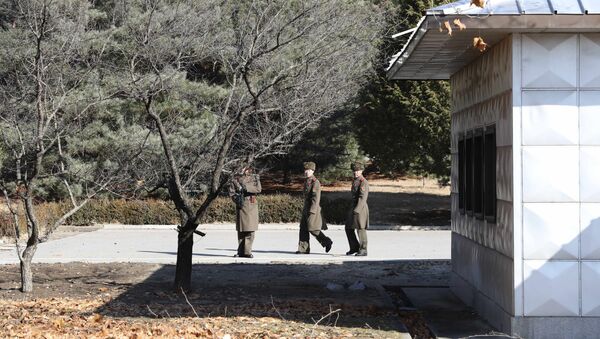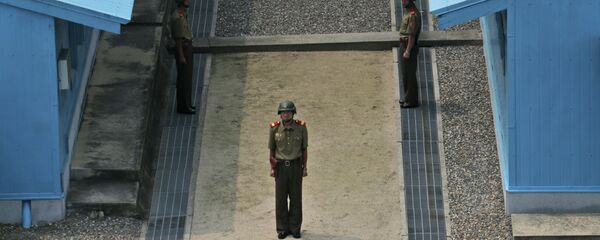At 9:30 am (00:30 GMT) local time on Friday, Kim Jong Un is expected to cross the military demarcation line in the Demilitarized Zone between the two Koreas, becoming the first North Korean leader to set foot in South Korean territory since the end of the Korean War in 1953.
Kim Jong Un’s official meeting with the South Korean president is expected to kick off at 10:30 am (01:30 GMT) at the Peace House in Panmunjom. Following their first round of talks in the morning, the two leaders will have lunch separately and hold a tree-planting ceremony in the afternoon, before engaging in the second round of talks.
READ MORE: North Korea's Nuclear Test Site Collapsed, Needs to be Monitored — Chinese Study
According to South Korean presidential secretary Im Jong Seok, the leaders of the two Koreas will sign an agreement and issue a joint statement at the end of their one-day summit.
South Korea Voice Heard
The South Korean president, known for his liberal position toward North Korea, has promoted engagement with Pyongyang since taking office in last May. But Moon’s friendly approach failed to stop the rapid advance of North Korea’s nuclear arms program in the following months, as Pyongyang proudly claimed the completion of its nuclear missile program in November last year.
Despite failing to bring Kim Jong Un to the negotiation table in the beginning, Moon’s efforts in promoting engagement have paid off, because it helped preserve South Korea’s role in the ongoing nuclear crisis, which had been dominated by Pyongyang and Washington, political analysts suggested.
"South Korea’s voice has increased in the discourse. Prior to the current announcement of the summits, the United States had its voice as loud as it could be and North Korea had its voice in the same manner. South Korea’s voice was basically hidden. It voice was not heard in the US discourse whatsoever. By pushing the summits, South Korea has gotten its voice to not only be heard in the United States, but also to be heard internationally. I think that’s a pretty good achievement," Jeffrey Robertson, a visiting fellow at the Asia-Pacific College of Diplomacy of the Australian National University and an assistant professor at Yonsei University in Seoul, told Sputnik.
Kim’s Game
However, South Korean scholars pointed out that this is the exact narrative the Moon administration tried to present.
"One view the Moon administration wants to promote is that this [summit] is the president’s achievement, because he wanted to invite North Korea to the negotiation table since the very beginning after he took office. The Moon administration wants to claim the credit for this [summit]. But this is a minority view in South Korea," Kim Byoung-joo, affiliate professor at Hankuk University of Foreign Studies in Seoul, told Sputnik.
Professor Kim expressed skepticism of such views, because Kim Jong Un looks to be in control of how the events unfolded.
"The majority view in South Korea, among those who are not friendly or support the Moon administration, is that Kim Jong Un is doing this whole thing by himself. That’s because he has achieved what he claims at full nuclear capability and now he has forced the United States come to the negotiation table. In return, North Korea would get what he has wanted for a long time, which is the security guarantee. Despite all the things that have happened, the United States has to guarantee the survival of the Kim regime in North Korea. This is Kim Jong Un playing his own winning game," he said.
Chinese North Korea watchers shared similar views on Kim Jong Un’s dominant position in dictating the current negotiations.
"The summit could take place primarily because of North Korea changing its position. Moon has no deciding power in this, because he repeatedly called for negotiations with North Korea after he took office and North Korea did not even bother to respond. Only after North Korea decided to take part in negotiations, the talks could take place. In this whole process, Moon is just being played by Kim Jong Un," Zhang Liangui, an expert on North Korea at the Central Party School, which trains Chinese officials in Beijing, told Sputnik.
Messenger Role
Nevertheless, South Korea has a chance to continue to play the role of messenger between Pyongyang and Washington after the summit on Friday, Professor Kim from Hankuk University of Foreign Studies noted.
"The summit tomorrow is a stepping stone or path toward the summit between Trump and Kim Jong Un. We heard reports that the South Korean government is working on setting up a summit between Trump and Moon before the summit between Trump and Kim Jong Un. Based on the discussion [with Kim Jong Un tomorrow], which may not be fully disclosed publicly, Moon will have a lot of things to tell Trump or guide him or even persuade him in order to have a more fundamental agreement between Pyongyang and Washington," he said.
The Seoul-based expert argued that the messenger role could also help South Korea secure its national interests during negotiations between North Korea and the United States.
"One of the important points Moon could offer Trump is to never accept the demand [from North Korea] of withdrawing US troops or reduction of US military presence and joint military defense [in South Korea]. Somehow, Moon probably would also explain to Trump that ‘complete, verifiable and irreversible denuclearization (CVID)’ will have to be the case. Otherwise, it’ll be difficult to convince the public in South Korea and the United States," he said.
But Zhang, the Beijing-based Chinese expert, believes South Korea’s voice could be very limited in the upcoming North Korea-US talks.
"The value of South Korea is to play the role of a messenger for North Korea, to deliver the important message that it is willing to improve relations with the United States. After Trump agreed to meet with Kim Jong Un, North Korea has established direct communication channels with the United States, as shown during CIA director Mike Pompeo’s visit to Pyongyang. It [North Korea] does not need South Korea to deliver its messages anymore," he said.
Kim Jong Un is expected to hold an official meeting with Trump in May or June, as both sides are still trying to pick the right location for the first summit between North Korea’s leader and a sitting US president.
The views and opinions expressed by the speakers do not necessarily reflect those of Sputnik.




